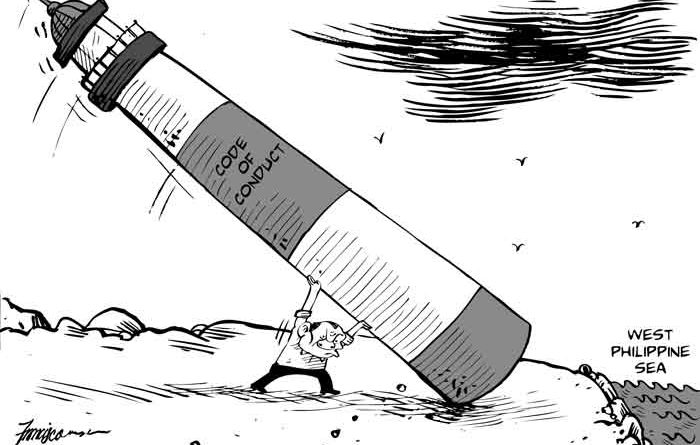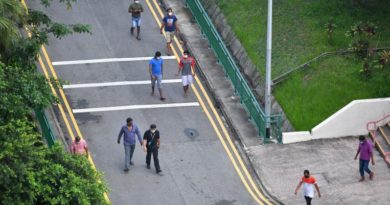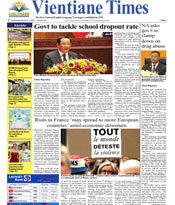OP-ED: No progress
The Association of Southeast Asian Nations has been calling for restraint and peaceful resolution of maritime regional conflicts for ages. ASEAN should do more to actually see restraint in aggressive activities to stake maritime claims in disputed waters.
ASEAN has had a regional agreement in place with China since 2002 on maintaining the status quo in the South China Sea. Probably because that deal is legally non-binding, however, it did not stop Beijing from constructing and fortifying artificial islands on seven reefs in disputed waters. The areas, now with missile defense systems, include Panganiban or Mischief Reef off Palawan in the West Philippine Sea, over which the Philippines has been awarded sovereign rights by the United Nations-backed Permanent Court of Arbitration in The Hague.
In the latest ASEAN leaders’ summit in the Thai capital Bangkok, the regional bloc has again called for self-restraint and peaceful resolution of maritime disputes. The statement was issued amid the latest incident in regional waters: the sinking of a Filipino fishing boat after it was hit by a Chinese vessel on June 9 near Recto or Reed Bank, one of three areas over which the Philippines was awarded sovereign rights by the arbitral court. Beijing had refused to participate in the arbitration.
At the same time, ASEAN again renewed its commitment to work with Beijing on a non-aggression Code of Conduct in the South China Sea to prevent serious armed encounters in disputed waters. These talks have been going for an eternity, with no agreement so far even on its area of coverage.
For the past decades, thanks in large part to ASEAN, Southeast Asia has been one of the most peaceful regions in the world, despite the diverse political systems and cultures of the grouping’s member states. Progress has been slow in certain areas such as economic integration, but the initiative is moving along.
Where the grouping has made no progress is in supporting its members in maritime disputes. In this issue, which is critical for sustaining the peaceful environment needed for regional prosperity, ASEAN needs to speak with a clearer, louder voice. (The Philippine Star)
.
OP-ED:
.
SINGAPORE’S
The Straits Times
Trump-Xi meet won’t yield a big deal
.
.
United States President Donald Trump’s announcement last week that he will meet his Chinese counterpart Xi Jinping on the sidelines of this week’s Group of 20 summit was greeted with cheer – and caution. Markets and the yuan rose on the news, but pundits threw cold water on the scheduled “extended meeting”, saying it was unlikely to deliver a trade deal. Such cautiousness is prudent as global markets were disappointed just last month by the collapse of trade talks between the world’s two largest economies when it had appeared that both sides were close to a deal. It turns out the gulf between them is so wide that 11 rounds of talks over almost a year have been unable to bridge it. China finds US demands to fix problems such as lopsided trade and forced technology transfer infringing on its sovereignty; the US feels that nothing short of what it wants will do.
An anticipated meeting between the two leaders at the G-20 summit in Osaka to ink the deal became a non-starter. Instead, what ensued was an escalation of the trade war with Mr Trump raising tariffs to 25 per cent on a total of US$250 billion (S$339 billion) worth of Chinese goods and continuing to go after Chinese tech giant Huawei. The Chinese retaliated with their own tariffs. Mr Trump threatened to impose tariffs on the remaining US$300 billion of Chinese imports, spooking not just businesses on both sides of the Pacific but also the rest of the world, which saw US$1 trillion wiped from markets in the past month as a result of the trade war.
TO READ THE FULL ARTICLE:
https://www.straitstimes.com/opinion/st-editorial/trump-xi-meet-wont-yield-a-big-deal
ADS by Cloud 9:
.
– SPACE RESERVE FOR YOUR ADVERTISEMENT –
.

–THIS SPACE BELOW IS RESERVE FOR YOUR ADVERTISEMENT –


THAILAND’S BANGKOK POST
EDITORIAL:
Isoc a proxy for army rule
Once a new cabinet is sworn in, the National Council for Peace and Order (NCPO) should be dissolved as it earlier planned. The country has had enough of having a military regime in charge of civil affairs.
But the military-dominated Internal Security Operations Command’s (Isoc) announcement last week that it would take over certain functions of the NCPO upon the latter’s “dissolution” is testament to the fact the regime has found its surrogate.
Of course, Isoc will not be as powerful as the NCPO, but it will maintain the control of security, social and political affairs that the regime has enjoyed over the past five years. This bodes ill for the country’s transition into civil rule. Isoc’s role in civil issues should be minimised, not enhanced.
For one thing, Isoc will be directed by the prime minister, Gen Prayut Chan-o-cha, who is also the NCPO leader. Under Gen Prayut’s rule, Isoc’s power and influence in the socio-political sphere have never been greater.
Even though Isoc was set up to counter the communist insurgency from the mid-1960s to the mid-1980s, it also engaged in social and political movements. After the Black May incident in 1992, its role became less prominent.
TO READ THE FULL ARTICLE:
https://www.bangkokpost.com/opinion/opinion/1700456/isoc-a-proxy-for-army-rule

All photographs, news, editorials, opinions, information, data, others have been taken from the Internet ..aseanews.net | [email protected] |.For comments, Email to :D’Equalizer | [email protected] | Contributor












